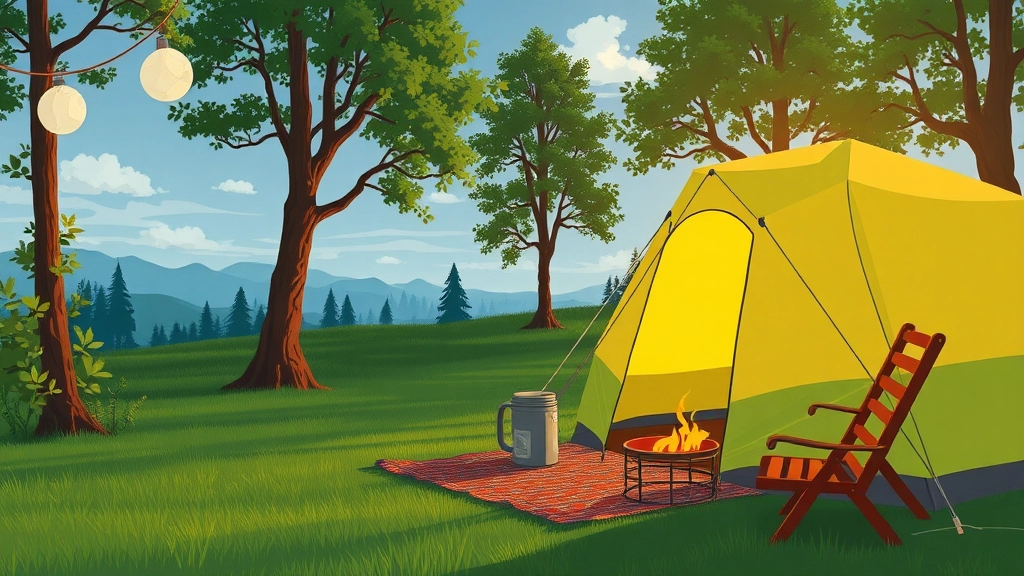Summer Camping: A Unique Opportunity
Summer camping offers a unique opportunity to reconnect with nature, unwind, and create lasting memories. Whether you’re a seasoned camper or a newbie, planning a summer camping trip can be both exhilarating and challenging. This article aims to guide you through the essentials, from selecting the best destinations to managing your budget effectively, ensuring a memorable and hassle-free experience.
What to Expect
We’ll delve into the best summer camping destinations, essential gear, and tips for planning and safety. Discover family-friendly activities, meal ideas, and eco-friendly practices to enhance your trip. Additionally, learn how to choose the right tent, manage bugs and wildlife, and implement budget-friendly hacks.
Join the Adventure
Let’s embark on this adventure together and make your summer camping trip unforgettable!
Best Summer Camping Destinations
So, you’re thinking about summer camping destinations, huh? It’s a big world out there, and choosing the perfect spot can feel overwhelming. Let’s break it down together, like we’re chatting over a cuppa.
Why Choose the Right Destination?
First off, why is picking the right spot so crucial? Well, imagine setting up camp only to find out it’s either too crowded or not what you expected. You want a place that fits your vibe, whether that’s peace and quiet or adventure-packed days.
Top Destinations to Consider
Here are some top picks that might just tick all your boxes:
Lake District, UK
- Stunning Views: Picture-perfect landscapes that make you want to whip out your camera every five minutes.
- Hiking Trails: Loads of trails for all levels. Whether you’re a pro or just starting out, there’s something here for you.
- Local Pubs: After a long day, who doesn’t love a good pub meal?
Yosemite National Park, USA
- Iconic Scenery: Think towering cliffs and waterfalls. It’s like stepping into a postcard.
- Activities Galore: Rock climbing, hiking, or just chilling by the water. You name it, they’ve got it.
- Wildlife: Keep your eyes peeled for bears and deer. Just remember to keep a safe distance!
Banff National Park, Canada
- Glacial Lakes: The blue waters are unreal. Perfect for kayaking or just gazing at.
- Wildlife Watching: Elk, bears, and more. It’s like a live-action nature documentary.
- Camping Options: From basic to glamping, there’s a spot for everyone.
What Makes These Spots Stand Out?
- Accessibility: Easy to get to, with plenty of facilities nearby.
- Variety: Whether you want to hike, swim, or just relax, these places offer it all.
- Natural Beauty: Let’s face it, you want a spot that makes you go “wow” every morning.
Quick Tips for Picking Your Destination
- Research: Look up reviews and photos. Get a feel for the place before you go.
- Consider the Crowd: Some spots get busy. If you want solitude, plan accordingly.
- Weather Check: Make sure you’re prepared for the climate.
If you’re looking to combine fun with learning, consider checking out Primrose Summer Camps. For those interested in sports, the Top Soccer Summer Camps might be just what you need.
Essential Camping Gear for Summer
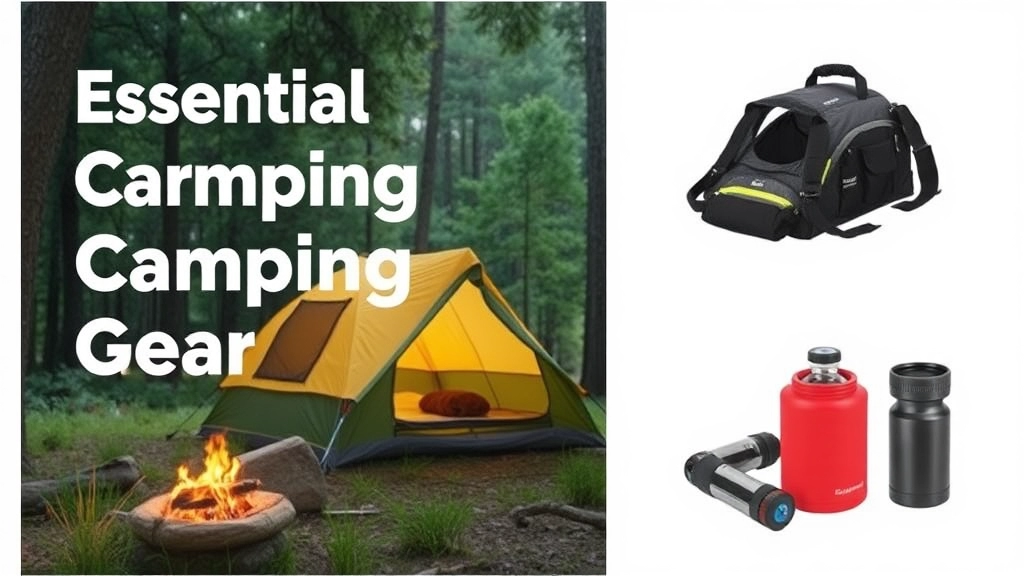
Alright, let’s talk about the essential camping gear for summer.
Ever been stuck in the middle of nowhere, sweating buckets, and realising you forgot something crucial? Yeah, me too.
Let’s avoid that nightmare.
Here’s what you need:
Tent
- Lightweight and breathable: You don’t want to feel like you’re in a sauna.
- Easy setup: Trust me, you don’t want to waste hours figuring out poles and pegs.
Sleeping Gear
- Sleeping bag: Go for a lightweight, summer-specific one.
- Sleeping pad or air mattress: Keeps you comfy and off the hard ground.
Cooking Gear
- Portable stove: Essential for those morning coffees and evening meals.
- Cookware: Think pots, pans, and utensils. Compact and durable.
- Cooler: Keeps your food fresh and your drinks cold.
Hydration
- Water bottles or hydration packs: Stay hydrated, folks.
- Water filter or purification tablets: Just in case you run out of clean water.
Clothing
- Moisture-wicking layers: Keeps you cool and dry.
- Hat and sunglasses: Protects you from the sun.
- Rain gear: Because summer showers are a thing.
Navigation Tools
- Map and compass: Old school, but reliable.
- GPS device or smartphone with offline maps: Modern backup.
Safety and First Aid
- First aid kit: Better to have it and not need it than need it and not have it.
- Sunscreen and insect repellent: Protect your skin.
Lighting
- Headlamp or flashlight: For those late-night bathroom trips.
- Extra batteries: Because the dark isn’t fun.
Miscellaneous
- Multi-tool or knife: Handy for all sorts of tasks.
- Trash bags: Leave no trace, folks.
- Camping chairs: Because sitting on the ground gets old fast.
Real Talk: Stories from the Trail
Last summer, I forgot my headlamp.
Yeah, I know, rookie mistake.
Had to navigate to the loo with my phone’s flashlight.
Not ideal.
And then there was the time I skipped the rain gear.
Got drenched in a surprise downpour.
Learned my lesson.
Final Thoughts
Having the right essential camping gear for summer can make or break your trip.
Trust me, you don’t want to be that person missing a crucial item.
Got any gear tips or stories? Share them below!
And if you’re planning your trip, check out our tips for planning a summer camping trip here!
Stay prepared, stay safe, and enjoy the great outdoors!
Tips for Planning a Summer Camping Trip
Planning a summer camping trip can be both exciting and daunting. We’ve all been there, staring at a map, wondering where to start. So, let’s break it down and make it simple.
Why Plan Ahead?
Ever been on a trip where everything went wrong? Yeah, me too. Planning ahead can save you from a lot of headaches. Here’s why:
- Avoid Crowds: Summer is peak camping season. Booking your campsite early means you get the best spots.
- Weather Check: Summer weather can be unpredictable. Knowing the forecast helps you pack right.
- Gear Prep: Forgetting essential gear can ruin your trip. Planning helps you double-check everything.
Where to Go?
Choosing the right destination is crucial. Here are a few things to consider:
- Proximity: How far are you willing to travel? Local spots are great for short trips.
- Activities: Do you want to hike, swim, or just relax? Pick a spot that offers what you’re looking for.
- Facilities: Some campsites offer amenities like showers and toilets. Others are more rugged. Choose what suits your comfort level.
What to Pack?
Packing can be overwhelming. Here’s a simple checklist to keep you on track:
- Essentials:
- Tent
- Sleeping bag
- Cooking gear
- First aid kit
- Clothing:
- Lightweight, breathable clothes
- Waterproof jacket
- Sturdy shoes
- Extras:
- Bug spray (trust me, you’ll need it)
- Sunscreen
- Maps and compass
Meal Planning
Nobody wants to live on granola bars for days. Here are some easy meal ideas:
- Breakfast: Oatmeal, fruit, and coffee
- Lunch: Sandwiches, wraps, or salads
- Dinner: Grilled meat, veggies, and pasta
- Snacks: Nuts, trail mix, and chocolate
Safety First
Safety should always be a priority. Here are some tips to keep you safe:
- Know the Area: Familiarise yourself with the terrain and local wildlife.
- Emergency Plan: Have a plan in case something goes wrong. Know the nearest hospital and ranger station.
- Stay Hydrated: Dehydration can sneak up on you. Always have plenty of water.
For more tips on essential camping gear, check out our guide on summer camp commissary snacks tips and our charter bus tips for a perfect summer camp trip.
Summer Camping Safety Tips
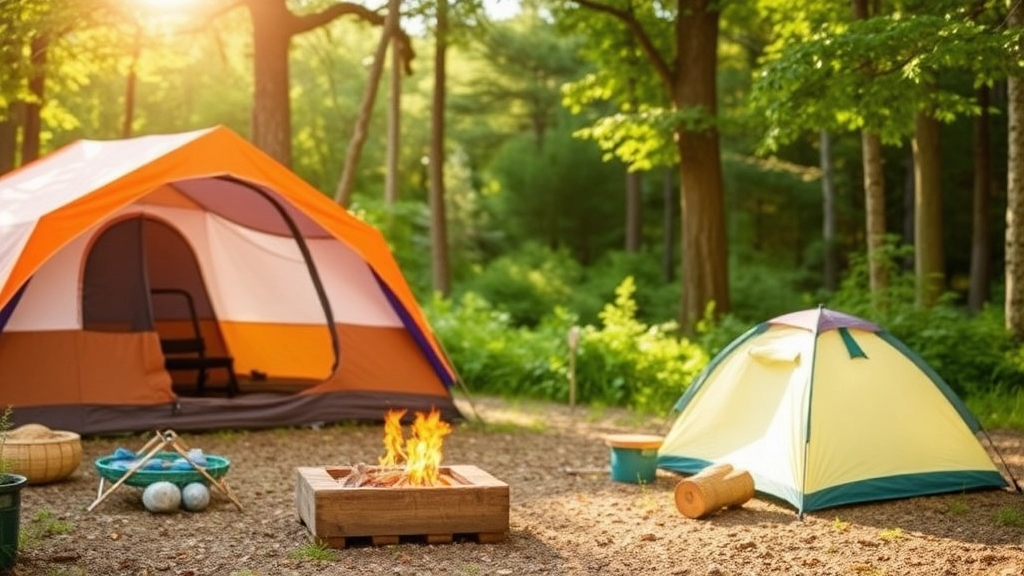
Worried about staying safe while camping this summer? You’re not alone. Let’s dive into some summer camping safety tips to make sure your trip is both fun and secure.
Stay Hydrated
- Dehydration can sneak up on you.
- Always carry plenty of water.
- Use a hydration pack or water bottles.
- Drink regularly, not just when you’re thirsty.
Sun Protection
- Sunburns are no joke.
- Apply sunscreen with at least SPF 30.
- Wear a wide-brimmed hat and UV-protective sunglasses.
- Seek shade during peak sun hours (10 AM to 4 PM).
Fire Safety
- Campfires are great, but they can be risky.
- Only build fires in designated areas.
- Keep a bucket of water or a fire extinguisher nearby.
- Never leave a fire unattended.
- Make sure the fire is completely out before leaving.
Wildlife Awareness
- Wild animals can be curious.
- Store food in sealed containers.
- Keep your campsite clean.
- Never feed the wildlife.
- Use a bear-proof canister if you’re in bear country.
First Aid Kit
- Accidents happen.
- Always bring a well-stocked first aid kit.
- Include bandages, antiseptic wipes, pain relievers, and any personal medications.
- Know basic first aid procedures.
Weather Preparedness
- Weather can change fast.
- Check the forecast before you go.
- Pack for all conditions—rain, heat, and cold.
- Know the signs of heat exhaustion and hypothermia.
Navigation Tools
- Getting lost is a real fear.
- Carry a map and compass.
- Don’t rely solely on your phone’s GPS.
- Let someone know your itinerary and expected return time.
Bug Protection
- Bugs can ruin a good time.
- Use insect repellent with DEET.
- Wear long sleeves and pants during peak mosquito hours.
- Consider a bug net for sleeping.
Food Safety
- Food poisoning is the last thing you want.
- Keep perishables in a cooler with ice packs.
- Cook food to the right temperature.
- Wash your hands and cooking utensils.
Emergency Contacts
- Know who to call.
- Have a list of emergency contacts.
- Know the nearest hospital or ranger station.
- Carry a whistle for attracting attention.
Family-Friendly Camping Activities
So, you’ve got the tent, the sleeping bags, and the marshmallows. But what about keeping everyone entertained? Family-friendly camping activities are a must to ensure everyone has a blast. Trust me, you don’t want bored kids (or adults) on your hands. Let’s dive into some killer activities that’ll make your summer camping trip unforgettable.
Why Are Family-Friendly Camping Activities Important?
Ever been on a trip where everyone just stares at their phones? Yeah, not fun. Camping is the perfect time to unplug and reconnect with each other. Family-friendly activities are crucial because they:
- Strengthen family bonds: Shared experiences create lasting memories.
- Promote physical activity: Get everyone moving and enjoying the great outdoors.
- Encourage learning: Nature is the best classroom.
Classic Camping Games
You can’t go wrong with the classics. These games are timeless for a reason â they’re simple, fun, and get everyone involved.
Scavenger Hunt
A scavenger hunt is a fantastic way to explore the campsite. Create a list of items for everyone to find, like a pinecone, a feather, or a specific type of leaf. Not only does this keep everyone busy, but it also teaches kids about nature.
Capture the Flag
This game is perfect if you’ve got a larger group. Split into two teams, hide a flag for each team, and then try to capture the other team’s flag without getting tagged. It’s a great way to burn off some energy and get everyone’s competitive spirit going.
Water-Based Activities
If your campsite is near a lake or river, you’re in luck. Water activities are a hit with all ages.
Swimming
Swimming is a no-brainer. Make sure to pack swimsuits, towels, and water shoes. Always keep an eye on the kids and follow safety guidelines.
Canoeing or Kayaking
Rent a canoe or kayak and explore the water. It’s a peaceful way to spend the afternoon and offers a unique perspective of your surroundings.
Evening Fun
The fun doesn’t stop when the sun goes down. Evening activities can be just as exciting.
Campfire Stories
Gather around the campfire and share stories. Whether it’s spooky tales or funny anecdotes, this is a great way to end the day. Pro tip: Bring a book of campfire stories if you’re not the best storyteller.
Stargazing
Clear skies are a camper’s best friend. Lay out some blankets, and look up at the stars. You can even download a stargazing app to identify constellations.
Creative Activities
Get those creative juices flowing with some arts and crafts.
Nature Art
Collect leaves, twigs, and rocks to create nature-inspired art. This can be as simple as making a collage or as intricate as building a fairy house.
DIY Bird Feeders
Bring some peanut butter, birdseed, and toilet paper rolls. Smear the peanut butter on the roll, roll it in birdseed, and hang it from a tree. It’s a fun project that also helps the local wildlife.
Quick Tips for Successful Family-Friendly Camping Activities
- Plan Ahead: Know what activities you want to do and pack any necessary supplies.
- Stay Flexible: Sometimes the best moments are unplanned. Be open to spontaneous fun.
- Safety First: Always keep an eye on the kids, especially near water or fire.
For more ideas on how to keep your summer exciting, check out our Top Soccer Summer Camps for Kids and Teens and explore the wide range of activities available at the OSCA Summer Camp.
Summer Camping Meal Ideas
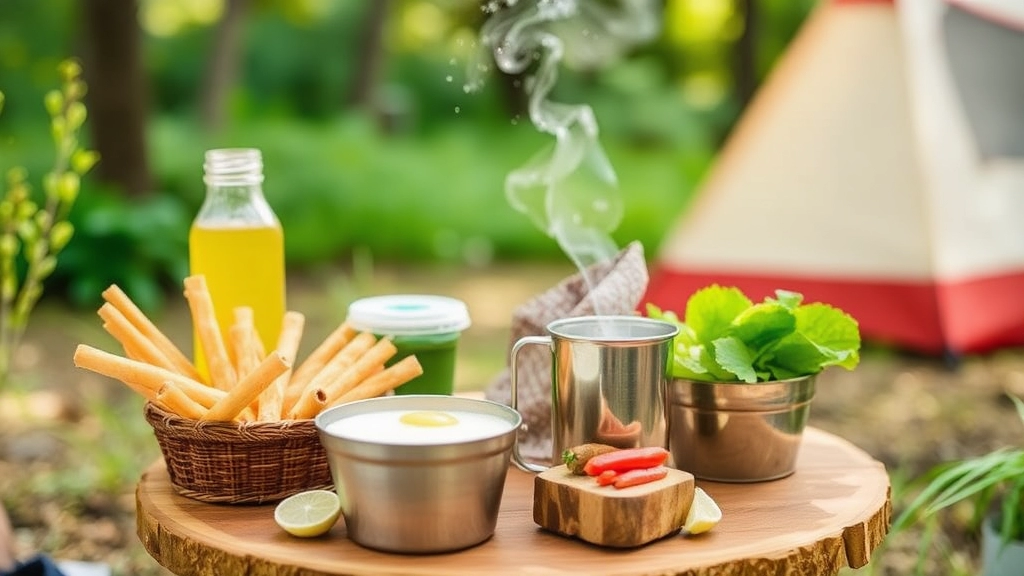
Ever been stumped on what to cook while camping in the summer? I’ve been there. You want meals that are easy, quick, and delicious.
Let’s dive in.
Quick and Easy Breakfasts
Start your day right.
- Oatmeal Packets: Just add hot water. Toss in some dried fruits or nuts for extra flavour.
- Breakfast Burritos: Pre-make them at home. Wrap in foil. Heat over the campfire.
- Yoghurt and Granola: No cooking needed. Just mix and enjoy.
Lunchtime Favourites
Keep it simple and light.
- Sandwiches: Go classic with ham and cheese. Or, try a veggie wrap with hummus.
- Salads: Prep at home. Store in a cooler. Think pasta salad or a simple green salad.
- Trail Mix: Mix nuts, dried fruits, and a bit of chocolate. Perfect for a quick snack.
Dinner Delights
End the day with a bang.
- Foil Pack Meals: Chicken, veggies, a bit of seasoning. Wrap in foil. Cook over the fire.
- Campfire Pizza: Use pre-made dough. Add your favourite toppings. Cook in a cast-iron skillet.
- Grilled Fish: Fresh catch? Season and grill. Serve with a squeeze of lemon.
Sweet Treats
Because who doesn’t love dessert?
- S’mores: Classic. Marshmallows, chocolate, graham crackers. Need I say more?
- Campfire Cones: Fill waffle cones with marshmallows, chocolate chips, and fruits. Wrap in foil. Heat over the fire.
- Fruit Skewers: Fresh fruits on a stick. Grill for a bit. Simple and sweet.
Pro Tips
Keep it fresh.
- Pre-Prep: Chop veggies, marinate meats, and portion out snacks before you leave.
- Cooler Management: Keep raw meats separate. Use plenty of ice. Replenish as needed.
- Plan Ahead: Know what meals you’ll make each day. Avoid last-minute scrambles.
Real Talk
I remember a trip where we forgot half our food. Ended up living on trail mix and instant noodles. Not fun.
Plan ahead. Prep smart. Enjoy your meals.
Got any favourite camping recipes? Share them with us!
Ready to plan your meals? Check out our Essential Camping Gear for Summer for everything you need to cook up a storm.
Happy camping!
Eco-Friendly Camping Practices
Ever wondered how to enjoy the great outdoors without leaving a mess behind? If you’re like me, you want to make sure your favourite camping spots stay pristine for future trips. So, let’s dive into some eco-friendly camping practices that’ll keep Mother Nature smiling.
Why Go Eco-Friendly?
First off, why should we even care about eco-friendly camping? Well, here’s the deal:
- Preservation: Keeps the environment unspoiled for future generations.
- Wildlife Protection: Ensures animals have a safe and clean habitat.
- Personal Health: Reduces exposure to harmful chemicals and pollutants.
Pack It In, Pack It Out
One of the golden rules of eco-friendly camping is to leave no trace. This means:
- Take all rubbish with you: Don’t leave any waste behind, not even biodegradable stuff.
- Recycle: Separate your waste and recycle wherever possible.
- Minimal Packaging: Use reusable containers instead of single-use plastics.
Choose Eco-Friendly Gear
When it comes to gear, every choice counts. Here’s what to look for:
- Sustainable Materials: Opt for gear made from recycled or sustainable materials.
- Durability: Invest in high-quality gear that lasts longer, reducing waste.
- Eco-Friendly Brands: Support companies dedicated to sustainable practices.
Campfire Etiquette
We all love a good campfire, but it’s essential to do it right:
- Use Established Fire Rings: Stick to designated fire areas to prevent wildfires.
- Keep Fires Small: Use only the wood you need and avoid burning trash.
- Fully Extinguish Fires: Make sure your fire is completely out before leaving.
Respect Wildlife
Remember, you’re a guest in their home:
- Observe from a Distance: Don’t approach or feed wild animals.
- Store Food Properly: Use bear-proof containers or hang food to keep it out of reach.
- Leave Natural Objects: Don’t take rocks, plants, or other natural items as souvenirs.
Water Conservation
Water is life, especially in the wild:
- Use Biodegradable Soap: Wash dishes and yourself at least 200 feet away from water sources.
- Minimise Water Use: Be mindful of your water consumption, especially in dry areas.
Transport and Travel
How you get to your campsite matters:
- Carpool: Share rides to reduce carbon emissions.
- Public Transport: If possible, use buses or trains.
- Bike or Hike: For nearby spots, consider biking or hiking to reduce your carbon footprint.
Eco-Friendly Camping Products
Here are some top picks for green camping gear:
| Product | Eco-Friendly Feature |
|---|---|
| Solar Lantern | Uses solar energy |
| Reusable Water Bottles | Reduces plastic waste |
| Bamboo Utensils | Sustainable material |
| Organic Sleeping Bags | Made from organic cotton |
Real-Life Example
Last summer, I camped in the Lake District and made it a point to follow these eco-friendly practices. Not only did I feel good about reducing my impact, but I also noticed how much cleaner and more enjoyable the site was. Plus, it’s a great way to teach kids about taking care of the planet.
Looking for more ways to enjoy nature responsibly? Check out our bucolic summer camps for a nature adventure or discover the top summer camps for teens that combine adventure, STEM, and arts.
Keyword: Eco-friendly camping practices
Choosing the Right Tent for Summer Camping
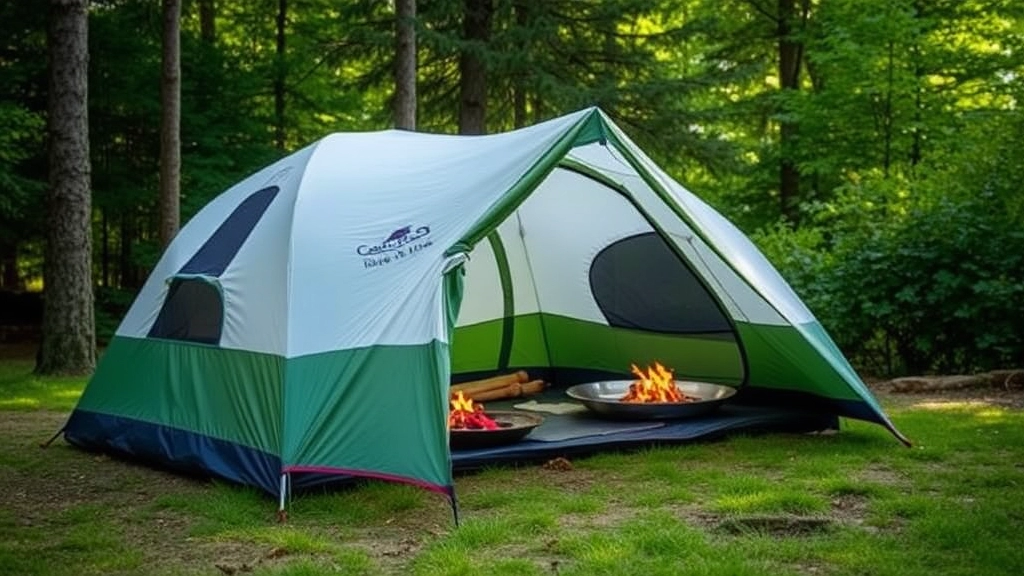
Ever had your tent turn into a sauna under the summer sun?
Yeah, not fun.
Choosing the right tent for summer camping is crucial.
You want to stay cool, comfy, and bug-free.
Here’s how to nail it:
Ventilation is Key
First off, ventilation.
You need a tent with plenty of mesh panels.
These let the breeze in and keep the bugs out.
Consider tents with large windows and roof vents.
They make a world of difference.
Lightweight and Easy to Carry
Summer camping means you’ll be moving around a lot.
So, go for a lightweight tent.
You don’t want to lug around a heavy tent in the heat.
Look for materials like nylon or polyester.
They’re durable but light.
Size Matters
Think about the size.
You want enough room to stretch out but not too much space that it becomes a hassle to set up.
A two-person tent is perfect for solo campers or couples.
For families, consider a four-person tent.
Weather Resistance
Summer weather can be unpredictable.
A sudden downpour can ruin your trip.
Make sure your tent has a good rainfly and waterproof seams.
You don’t want to wake up in a puddle.
Easy Setup
You don’t want to spend hours setting up your tent.
Look for easy-to-pitch options.
Pop-up tents are great for this.
They practically set themselves up.
Real Stories
I remember my first summer camping trip.
I had this heavy, poorly ventilated tent.
It was like sleeping in a sauna.
I quickly learned my lesson.
Now, I always go for a lightweight, well-ventilated tent.
Quick Recap
- Ventilation: Mesh panels, large windows, roof vents.
- Lightweight: Nylon or polyester materials.
- Size: Two-person for solo or couples, four-person for families.
- Weather Resistance: Rainfly, waterproof seams.
- Easy Setup: Pop-up tents or easy-to-pitch designs.
Choosing the right tent can make or break your summer camping trip.
Trust me, I’ve been there.
Make sure you pick one that keeps you cool, dry, and comfortable.
Managing Bugs and Wildlife
Alright, let’s cut to the chase. You’ve planned this epic summer camping trip, but the thought of bugs and wildlife is gnawing at you. How do you enjoy nature without becoming a bug buffet or a midnight snack for a curious critter? Trust me, I’ve been there, and I’ve got some solid tips to help you manage bugs and wildlife like a pro.
Why Bugs and Wildlife Are a Concern
First off, let’s get real. Bugs can be more than just annoying. Mosquitoes can carry diseases, ticks can give you Lyme disease, and let’s not even get started on wasps. As for wildlife, you don’t want to wake up to a raccoon rummaging through your food or, worse, a bear sniffing around your tent. So, what do we do about it?
Essential Bug Management Tips
- Choose the Right Campsite:
- Avoid areas with standing water; mosquitoes love these spots.
- Set up camp away from dense foliage where ticks and other bugs thrive.
- Use Bug Repellent:
- Go for DEET-based repellents for the best protection.
- Natural options like citronella can work, but they’re not as effective.
- Wear Appropriate Clothing:
- Long sleeves and trousers can be lifesavers.
- Light-coloured clothing makes it easier to spot ticks.
- Set Up Bug Barriers:
- Mosquito nets are a must if you’re in a high-bug area.
- Use screened tents to keep the bugs out while you sleep.
Wildlife Management Tips
- Store Food Properly:
- Use bear canisters or hang your food in a tree away from your campsite.
- Never leave food scraps or wrappers lying around.
- Keep a Clean Campsite:
- Dispose of trash properly and immediately.
- Clean your cooking area thoroughly after meals.
- Know Your Wildlife:
- Research the types of animals in the area and how to deal with them.
- Bear spray can be a good investment if you’re in bear country.
- Make Noise:
- Animals generally avoid humans. Clap, talk loudly, or use a bear bell when hiking to avoid surprising them.
Real-Life Example
Let me tell you about a trip I took to the Lake District. I thought I was prepared, but I made the rookie mistake of leaving some snacks out. Woke up to a family of raccoons having a midnight feast. Lesson learned: always store your food properly and keep your campsite clean.
Quick Recap
Managing bugs and wildlife is all about preparation and awareness. Here’s your quick checklist:
- Choose the right campsite
- Use effective bug repellent
- Wear protective clothing
- Set up bug barriers
- Store food properly
- Keep your campsite clean
- Know the local wildlife
- Make noise to avoid surprising animals
Remember, the keyword here is managing bugs and wildlife. Get these basics down, and you’ll be able to enjoy your camping trip without the added stress. Happy camping!
For more tips on making your summer camp experience enjoyable, check out our top soccer summer camps and our guide on charter bus tips for a perfect summer camp trip.
Budget-Friendly Camping Hacks
Are you worried about the cost of camping?
I get it.
Camping can seem expensive, but it doesn’t have to be.
Let’s dive into some budget-friendly camping hacks that will save you money and make your trip unforgettable.
Hack #1: Borrow or Rent Gear
Why buy when you can borrow?
Ask friends or family if they have gear you can use.
If borrowing isn’t an option, consider renting.
Many outdoor shops offer rentals for tents, sleeping bags, and other essentials.
Hack #2: Shop Second-Hand
Thrift stores and online marketplaces are gold mines for camping gear.
You can find everything from tents to cookware at a fraction of the price.
Just make sure to check the condition before you buy.
Hack #3: DIY Camping Supplies
Get creative with DIY projects.
Make your own fire starters with dryer lint and egg cartons.
Use old blankets and pillows instead of buying new sleeping bags.
Hack #4: Plan Meals in Advance
Pre-planning meals can save you a ton of money.
Opt for simple, non-perishable foods like:
- Canned beans
- Pasta
- Rice
- Trail mix
Pre-packaged meals are convenient but pricey.
Hack #5: Free Campsites
Why pay for a campsite when you can camp for free?
Look for free camping spots in national forests or public lands.
Websites like Freecampsites.net can help you find these hidden gems.
Hack #6: Multi-Use Items
Pack items that serve multiple purposes.
A bandana can be a towel, a pot holder, or even a headband.
A Swiss Army knife can replace several tools.
Hack #7: Carpool
Share the ride with friends to split the cost of fuel.
Plus, it’s more fun to travel together.
Hack #8: Off-Season Camping
Camping in the off-season can save you loads of money.
Campgrounds are less crowded, and rates are often lower.
Hack #9: Use Nature
Nature provides plenty of free entertainment.
Hiking, swimming, and stargazing cost nothing.
Hack #10: Budget-Friendly Activities
Plan activities that don’t require spending money.
- Scavenger hunts
- Storytelling around the campfire
- Nature photography
Camping on a budget is totally doable.
With these hacks, you’ll save money and still have an amazing time.
If you’re looking for more ideas on affordable summer activities, check out our all-day summer camps in DeSoto, TX or explore the bucolic summer camps for a nature adventure.
FAQs: Summer Camping
What are the essential camping gear items for summer?
Essential camping gear for summer includes a lightweight and breathable tent, summer-specific sleeping bag, portable stove, hydration packs, moisture-wicking clothing, navigation tools, first aid kit, and lighting equipment such as a headlamp or flashlight.
How can I stay safe while camping in the summer?
To stay safe, ensure you stay hydrated, use sun protection, practice fire safety, be aware of wildlife, carry a first aid kit, prepare for changing weather, use navigation tools, protect against bugs, follow food safety guidelines, and have emergency contacts handy.
What are some easy meal ideas for summer camping?
Easy meal ideas include oatmeal packets, breakfast burritos, yoghurt and granola for breakfast; sandwiches, salads, and trail mix for lunch; foil pack meals, campfire pizza, and grilled fish for dinner; and s’mores, campfire cones, and fruit skewers for dessert.
How do I choose the right tent for summer camping?
Choose a tent with good ventilation, lightweight materials, appropriate size, weather resistance features like a rainfly and waterproof seams, and an easy setup design. Mesh panels, large windows, and roof vents are particularly important for staying cool.
What should I do to ensure hydration during summer camping?
Always carry plenty of water, use hydration packs or water bottles, drink regularly, and consider bringing a water filter or purification tablets in case you run out of clean water.
What kind of clothing is best for summer camping?
Opt for moisture-wicking layers to keep you cool and dry, wear a hat and sunglasses for sun protection, and bring rain gear for unexpected summer showers.
How can I protect myself from bugs while camping?
Use insect repellent with DEET, wear long sleeves and pants during peak mosquito hours, and consider using a bug net for sleeping.
What should be included in a summer camping first aid kit?
A well-stocked first aid kit should include bandages, antiseptic wipes, pain relievers, any personal medications, and knowledge of basic first aid procedures.
How can I practice fire safety while camping?
Build fires only in designated areas, keep a bucket of water or a fire extinguisher nearby, never leave a fire unattended, and ensure the fire is completely out before leaving.
What are some tips for food safety during summer camping?
Keep perishables in a cooler with ice packs, cook food to the right temperature, wash your hands and cooking utensils, and avoid leaving food out to prevent attracting wildlife.
What navigation tools should I bring for summer camping?
Carry a map and compass, and have a GPS device or smartphone with offline maps as a backup. Always let someone know your itinerary and expected return time.
References
-
REI’s Camping Checklist
-
Backpacker’s Guide to Camping
-
CleverHiker’s Essential Backpacking Gear

